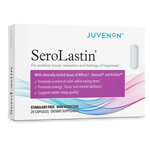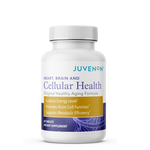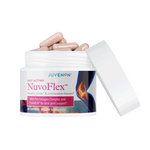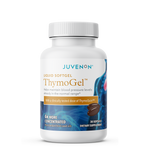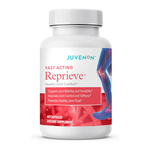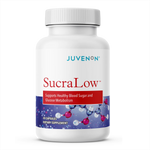
Stress is an unavoidable part of life. Whether positive stress, like the alert state when getting ready for a big presentation, or negative stress, like being stuck in traffic, stress is a normal and natural part of the human experience.
But stress becomes a problem when it outpaces our body’s resilience. In today’s fast-paced culture, it’s easy for stressors to compound. Our brains may be overstimulated by the constant barrage of information from the internet portals at our fingertips. Add in the normal (or, in some cases, excessive) stressors of daily life, and it’s no surprise that almost 1 in 4 adults in the US struggle with anxiety. (1)
Finding healthy ways to cope with stress is essential to prevent the negative consequences of constant strain on the nervous system. Unchecked, high levels of stress can damage health and make you feel miserable. Without a plan for how you will deal with life stressors, you may find yourself unhappy, burnt out, and unwell.
In addition to other stress-relieving habits like exercise, sleeping well, and eating a quality diet, some people benefit from the use of an adaptogen supplement. Ashwagandha is one of the most well-researched stress-relieving adaptogens out there. And it may be right for you.
Let’s look closer at:
- How stress affects the body
- What ashwagandha is and how it can help
- The science behind ashwagandha’s stress relieving benefits
- Ashwagandha’s benefits for women
- How Juvenon’s Serolastin can help reduce stress
What Stress Does to the Body
Your body’s stress response is a sophisticated survival mechanism originally designed to keep you safe. It works something like this: (2)
- You see, hear, or sense danger, such as a nearby predator.
- The sympathetic nervous system is activated, also known as the “freeze-fight-or-flight” system.
- A cascade of stress hormones floods the body, including:
- Adrenaline (epinephrine)
- Cortisol
- These hormones prepare the body to either freeze, fight off danger or flee.
- Heart rate increases
- Blood pressure rises
- Muscles prepare for fast action
- Brain alertness and focus increase
- Blood is diverted from non-critical systems such as the immune system and digestion
- Respiration increases
- You take appropriate action to escape danger.
- Once the danger has passed, the parasympathetic nervous system takes over, putting the brakes on the freeze, fight or flight response and allowing the body to return to a relaxed state.
This cycle is an evolutionary adaptation designed to keep you safe. For much of human history, it was essential for survival. However, modern life contains few true dangers. You’re unlikely to face a bear or need to run for your life.
This mismatch between the current environment and evolutionary design, results in a brain highly responsive to perceived danger paired with modern lifestyles often filled with chronic stress. This is a recipe for poor health.
How Stress Affects Your Health
As smart as your brain is, it struggles to differentiate between physical danger and psychological stress. In your day-to-day life, the majority of stressors you face likely don’t represent a true threat to your survival. Yet, your body’s response may be the same.
A stressful day at work may active the sympathetic nervous system as your brain interprets your feelings of anxiety and tension as a threat. Hearing or reading about upsetting current events can alert the body to danger, even if you’re not directly involved. Worry about your friends and loved ones, financial struggles, traumatic experiences, and depleting lifestyle habits can combine to keep your body in a constant state of tension.
Over time, a chronic level of sympathetic nervous system activation from stress causes trouble. A constant infusion of the hormone cortisol, while beneficial when you need to run from a bear, interferes with healthy body function. While your body systems can compensate for a time, eventually the effects of constant strain becomes apparent.
Chronic stress can lead to: (3)
- Decreased immunity
- Poor digestion
- Difficulty concentrating
- Trouble with short-term memory
- High blood pressure
- Increased risk of disease
- Hormonal imbalance
- Fatigue
- Anxiety and/or depression
- Trouble sleeping
- Weight gain
People who experience a lot of stressors, without balancing them with healthy coping tools, may be taking years off their life. A recent study found that among both men and women, individuals with the highest levels of stress had a life expectancy shortened by almost 2.5 years, compared to those with manageable levels of stress. (4)
Stress isn’t going away. But how you help your mind and body manage stress determines whether you struggle or thrive.
Stress and Women’s Health
Some of the effects of chronic stress are the same for men and women. However, women may experience some unique issues under stress. Their systems are highly attuned to the influence of female hormonal cycles, and the hormonal imbalance caused by chronic stress can impact them differently.
Effects may include: (5)
- Menstrual cycle irregularities
- Difficulty getting pregnant
- Poor libido
- Headaches or migraines
- Increased risk of depression or anxiety compared to men (6,7)
- Higher risk of obesity compared to men (7)
- Increased risk of irritable bowel syndrome (IBS)
Tools to Reduce Stress

Regardless of gender, managing chronic stress is essential for both short and long-term health. While experiencing stress is unavoidable, helping your mind and body cope with stress can greatly enhance your life.
For most people it takes a blend of different stress-reducing tools to find a good balance. Common strategies include:
- Meditation
- Mindfulness
- Exercise
- Eating a healthy diet
- Mindful movements such as yoga or tai chi
- Breathing techniques
- Journaling
- Social connection
- Stress-relieving supplements to support the nervous system and hormonal balance
Healthy stress-reducing lifestyle habits protect against the effects of chronic stress. But for some people, lifestyle changes may not be enough to heal the effects of chronic stress. And there may be times in life when stress goes up and extra support is needed.
This is where a quality supplement can help. Some of the most well-researched supplements for stress relief are adaptogens. Let’s look closer at the adaptogen ashwagandha and the science behind its use to relieve stress.
The Science Behind Ashwagandha’s Stress-Relieving Benefits
Ashwagandha is an evergreen shrub grown in parts of Asia, Africa, and Europe. It has a long history of use as a medicinal plant in traditional medicine systems in Asia. Its most common use is as an adaptogen, a plant with properties that support the body's resilience and adaptability to stress. (8)
Ashwagandha contains bioactive compounds calledwithanolides.These compounds have anti-inflammatory and antioxidant properties. (9) Inflammation is one of the primary ways stress negatively affects the body, contributing to cardiovascular disease, metabolic dysfunction, mental health disorders, and an increased risk of cancer. (10) The anti-inflammatory actions of ashwagandha may protect against some of the most damaging effects of stress.
Ashwagandha also influences gamma-aminobutyric acid (GABA), a neurotransmitter that inhibits nerve cells' ability to receive and send signals to other nerve cells. The result is a calming effect on the nervous system and reduced feelings of stress and tension. (11)
Studies examining the effects of Ashwagandha on stress and anxiety report significant benefits. (12,13) In addition to reducing stress, studies have documented improvements in depression, insomnia, and fertility. (14)
Ashwagandha has particular benefits for women. Because women often experience a significant hormonal imbalance with chronic stress, ashwagandha may provide unique modulating effects on their metabolic system. It may:
- Boost sexual desire and satisfaction (15)
- Reduce fatigue (16)
- Positively influence hormonal balance (17,18)
- Reduce levels of cortisol (19)
Thebest ashwagandha supplements are made from the Ashwagandha root and leaf. We formulated our Juvenon Serolastin to contain Ashwagandha root and leaf extract to provide potent stress-relieving power. In combination with saffron extract,alpinia galanga root extract, and a boost of B vitamins, Serolastin may reduce fatigue, calm stress and anxiety, restore optimal hormone balance and encourage weight loss.
In one study of people taking sensoril Ashwagandha (similar to that used in Juvenon Serolastin), 125 mg a day taken for 60 days produced a 63% drop in overall anxiety and a 32% drop in cortisol ratio levels.
Serolastin provides all of the science-backedbenefits of Ashwagandha for women. In addition to relieving stress, Serolastin my reduce perimenopausal symptoms like hot flashes, mood swings, and fatigue. By modulating cortisol levels in the body, Serolastin my aid in healthy weight loss.
Takeaways
Managing your body’s response to stress is essential for long-term health, especially for women. Unchecked, stress places strain on every body system, disrupts hormone balance, and increases the risk of disease.
The body is not disgned to stay in a state of constant tension. Rexlaxation techniques like meditation or yoga, and healthy lifestyle habits like diet and exercise aid in managing stress. Adding one of thebest aswagandha supplements, Juvenon Serolastin, provides an extra boost of stress-relieving support.
References:
- https://www.nami.org/About-Mental-Illness/Mental-Health-Conditions/Anxiety-Disorders#:~:text=Over%2040%20million%20adults%20in,%25)
- https://www.ncbi.nlm.nih.gov/books/NBK541120/#:~:text=A%20stressful%20situation%2C%20whether%20environmental,%22fight%20or%20flight%22%20response.
- Yaribeygi H, Panahi Y, Sahraei H, Johnston TP, Sahebkar A. The impact of stress on body function: A review. EXCLI J. 2017 Jul 21;16:1057-1072. doi: 10.17179/excli2017-480. PMID: 28900385; PMCID: PMC5579396.
- Härkänen T, Kuulasmaa K, Sares-Jäske L, Jousilahti P, Peltonen M, Borodulin K, Knekt P, Koskinen S. Estimating expected life-years and risk factor associations with mortality in Finland: cohort study. BMJ Open. 2020 Mar 8;10(3):e033741. doi: 10.1136/bmjopen-2019-033741. PMID: 32152164; PMCID: PMC7064132.
- https://www.womenshealth.gov/mental-health/good-mental-health/stress-and-your-health
- Hammen C, Kim EY, Eberhart NK, Brennan PA. Chronic and acute stress and the prediction of major depression in women. Depress Anxiety. 2009;26(8):718-23. doi: 10.1002/da.20571. PMID: 19496077; PMCID: PMC3380803.
- https://www.samhsa.gov/data/sites/default/files/2012-BHUS.pdf
- Panossian AG, Efferth T, Shikov AN, Pozharitskaya ON, Kuchta K, Mukherjee PK, Banerjee S, Heinrich M, Wu W, Guo DA, Wagner H. Evolution of the adaptogenic concept from traditional use to medical systems: Pharmacology of stress- and aging-related diseases. Med Res Rev. 2021 Jan;41(1):630-703. doi: 10.1002/med.21743. Epub 2020 Oct 25. PMID: 33103257; PMCID: PMC7756641.
- https://www.nccih.nih.gov/health/ashwagandha
- Liu YZ, Wang YX, Jiang CL. Inflammation: The Common Pathway of Stress-Related Diseases. Front Hum Neurosci. 2017 Jun 20;11:316. doi: 10.3389/fnhum.2017.00316. PMID: 28676747; PMCID: PMC5476783.
- Savage K, Firth J, Stough C, Sarris J. GABA-modulating phytomedicines for anxiety: A systematic review of preclinical and clinical evidence. Phytother Res. 2018 Jan;32(1):3-18. doi: 10.1002/ptr.5940. Epub 2017 Nov 23. PMID: 29168225.
- Speers AB, Cabey KA, Soumyanath A, Wright KM. Effects ofWithania somnifera (Ashwagandha) on Stress and the Stress- Related Neuropsychiatric Disorders Anxiety, Depression, and Insomnia. Curr Neuropharmacol. 2021;19(9):1468-1495. doi: 10.2174/1570159X19666210712151556. PMID: 34254920; PMCID: PMC8762185.
- Lopresti AL, Smith SJ, Malvi H, Kodgule R. An investigation into the stress-relieving and pharmacological actions of an ashwagandha (Withania somnifera) extract: A randomized, double-blind, placebo-controlled study. Medicine (Baltimore). 2019 Sep;98(37):e17186. doi: 10.1097/MD.0000000000017186. PMID: 31517876; PMCID: PMC6750292.
- Tandon N, Yadav SS. Safety and clinical effectiveness of Withania Somnifera (Linn.) Dunal root in human ailments. J Ethnopharmacol. 2020 Jun 12;255:112768. doi: 10.1016/j.jep.2020.112768. Epub 2020 Mar 19. PMID: 32201301.
- Ajgaonkar A, Jain M, Debnath K. Efficacy and Safety of Ashwagandha (Withania somnifera) Root Extract for Improvement of Sexual Health in Healthy Women: A Prospective, Randomized, Placebo-Controlled Study. Cureus. 2022 Oct 28;14(10):e30787. doi: 10.7759/cureus.30787. PMID: 36447681; PMCID: PMC9701317.
- Smith SJ, Lopresti AL, Fairchild TJ. Exploring the efficacy and safety of a novel standardized ashwagandha (Withania somnifera) root extract (Witholytin®) in adults experiencing high stress and fatigue in a randomized, double-blind, placebo-controlled trial. J Psychopharmacol. 2023 Nov;37(11):1091-1104. doi: 10.1177/02698811231200023. Epub 2023 Sep 23. PMID: 37740662; PMCID: PMC10647917.
- Akbaribazm M, Goodarzi N, Rahimi M. Female infertility and herbal medicine: An overview of the new findings. Food Sci Nutr. 2021 Aug 15;9(10):5869-5882. doi: 10.1002/fsn3.2523. PMID: 34646552; PMCID: PMC8498057.
- Nasimi Doost Azgomi R, Zomorrodi A, Nazemyieh H, Fazljou SMB, Sadeghi Bazargani H, Nejatbakhsh F, Moini Jazani A, Ahmadi AsrBadr Y. Effects ofWithania somnifera on Reproductive System: A Systematic Review of the Available Evidence. Biomed Res Int. 2018 Jan 24;2018:4076430. doi: 10.1155/2018/4076430. Erratum in: Biomed Res Int. 2019 Nov 21;2019:7591541. PMID: 29670898; PMCID: PMC5833251.
- Salve J, Pate S, Debnath K, Langade D. Adaptogenic and Anxiolytic Effects of Ashwagandha Root Extract in Healthy Adults: A Double-blind, Randomized, Placebo-controlled Clinical Study. Cureus. 2019 Dec 25;11(12):e6466. doi: 10.7759/cureus.6466. PMID: 32021735; PMCID: PMC6979308.




